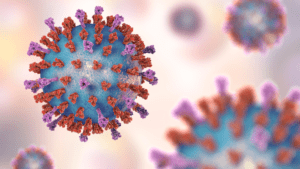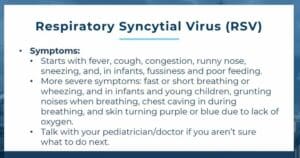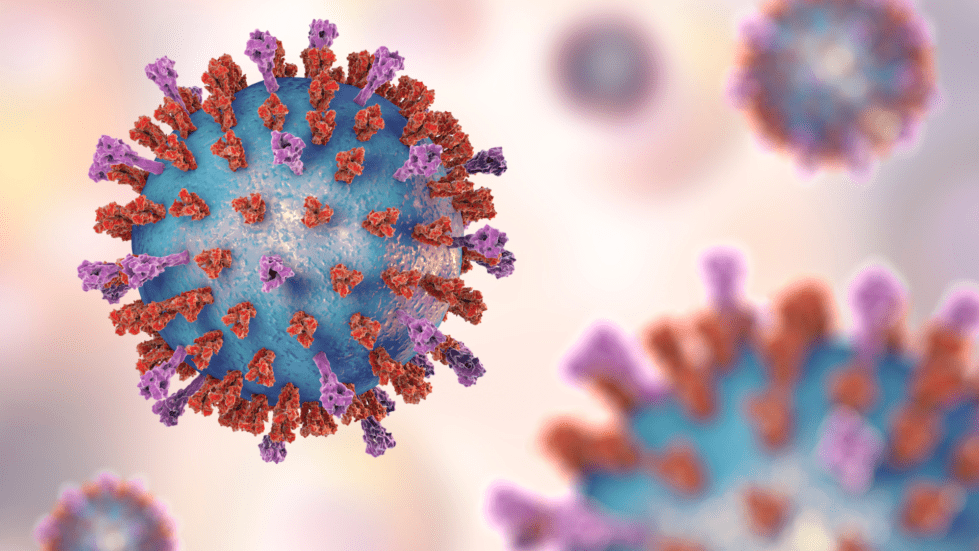
RSV virus, shown here, is a hot topic for health officials and parents of young children. Getty Images.
As the number of cases of three winter respiratory viruses rise sharply in Delaware, state officials on Monday asked residents to take action to protect themselves and their families.
Gov. John Carney compared the increasing numbers of COVID to rises at this time in 2020 and 2021, leading into the holidays.
State health officials would like to avoid a tsunami of COVID-19, flu and respiratory syncytial virus and a repeat of last winter’s frantic January with record number of cases, hospitalizations, deaths and dire impacts on schools and businesses.
Their advice to stem that tide will sound familiar: Be vaccinated. Stay home if you’re sick. Seek medical help if you have underlying conditions or the infection seems severe. Be tested if you’re sick or if you’re going to visit people who are vulnerable. Wear a mask in crowded situations to avoid being infected.
Possible tripledemic
Among the tidbits thrown out during Monday’s online press conference were:
- 483 new cases of the flu were reported in the last week, more than half of what’s been reported so far this season.
- Delaware recorded 104 cases of RSV in the last week, which is 20% of the state’s total this season. That virus hits infants and toddlers particularly hard because of their small airways.
- There’s been 131 new cases of COVID-19 in the last week, with 86 people hospitalized, 10 critical. Even so, that’s much lower than it’s been at this time in previous years, partly because so many people have been vaccinated.
This time last year, said Carney, the state was seeing a mounting number of COVID cases that lead to crushing numbers of cases caused by the Omicron variant. The 2022 rise is not as steep as it’s been in recent years, he said.
Nationally, health officials are warning that the three viruses could form a “tripledemic” that threatens to overwhelm the healthcare system at a time when most institutions are struggling to keep an adequate work force after 2 1/2 years of dealing with the coronavirus pandemic.
In addition to the 86 people hospitalized because of COVID-19, 20 people have been hospitalized because of flu.
While flu cases generally climb into January and often peak in the late winter and early spring, the flu has taken hold much earlier this year, said Molly Magarik, secretary of the Delaware Department of Health and Social Services. It includes the Division of Public Health.
People who put off their flu vaccines, which are considered effective for about six months, until later in winter in order to be covered for spring should go ahead and get their vaccine now, she said.
This season has started early with lab-confirmed cases showing up in September, even though the season is considered to start in October. The number of cases doubled from 218 to 483 in the fourth week, she said.
Because only a fraction of cases are confirmed by laboratory tests, hundreds to thousands of other cases likely are circulating.
The state recently established a flu dashboard to make the information more accessible to the public. Find it here.

The Delaware Division of Public Health lists the symptoms of RSV.
What parents should watch for
Magarik said that surrounding states are reported that the number of RSV cases seem to be declining.

Dr. Priscilla Mpasi
Dr. Priscilla Mpasi, a pediatrician and associate clinical director of Complex Primary Care and Community Medicine at ChristianaCare, said parents worried about their little ones and RSV should pay particular attention to changes in behavior.
She urged parents to monitor their kids for fever. The higher the fever, and the more days a child has a fever usually indicates a greater severity of RSV illness, she said.
“This should really put you on alert to watch more closely for symptoms in your child,” Mpasi said.
Most of the viruses start with a cough, congestion and runny nose. She suggested that parents test their children to determine whether they have COVID-19 or not. RSV is hardest on children 2 and younger.
The sicker a child is with RSV, the more changes in behavior a parent will see. That will include a decrease in appetite and decrease in energy, including a child appearing unusually sleepy.
A parent may notice breathing issues, such as a child being short of breath, wheezing or the child’s chest seemed to cave in as he or she struggled to breathe.
Those symptoms, or a child’s lips and nail beds turning blue, which indicates a lack of oxygen, require immediate emergency care, Magarik said.

Betsy Price is a Wilmington freelance writer who has 40 years of experience, including 15 at The News Journal in Delaware.
Share this Post




